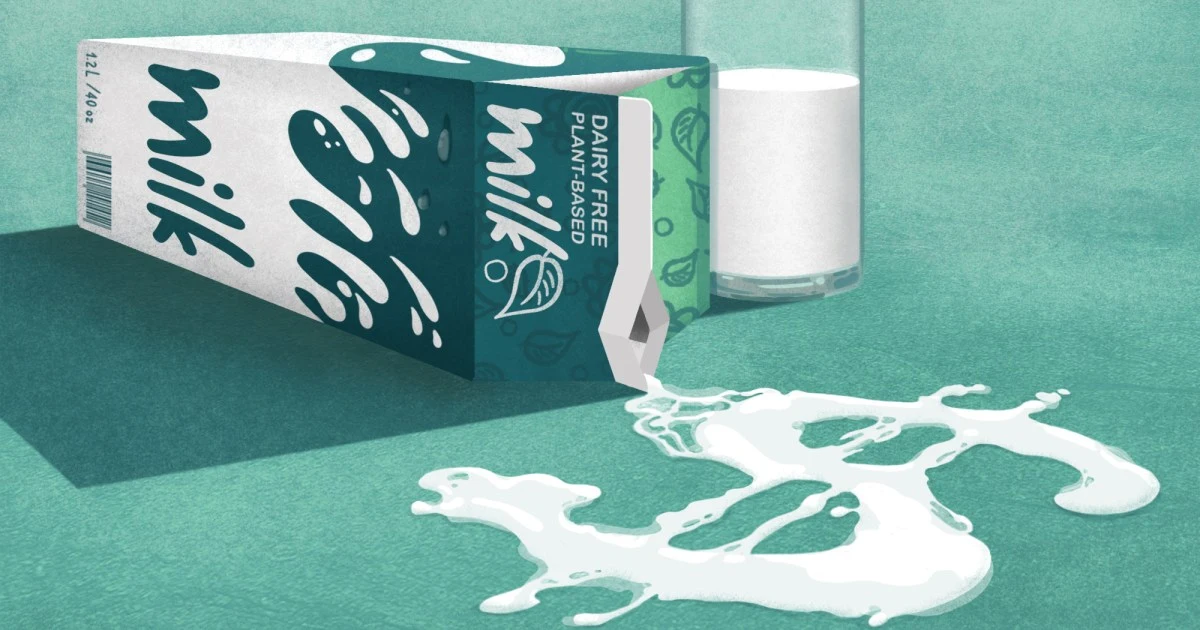Plant Milk Is Better For Us and the Climate. So Why Do We Subsidize Dairy?
Plant Milk Is Better For Us and the Climate. So Why Do We Subsidize Dairy?

Enough dairy subsidies! Plant milk is better for us and the planet

Like an estimated two-thirds of the world’s population, I don’t digest lactose well, which makes the occasional latte an especially pricey proposition. So it was a pleasant surprise when, shortly after moving to San Francisco, I ordered a drink at Blue Bottle Coffee and didn’t have to ask—or pay extra—for a milk alternative. Since 2022, the once Oakland-based, now Nestlé-owned cafe chain has defaulted to oat milk, both to cut carbon emissions and because lots of its affluent-tending customers were already choosing it as their go-to.
Plant-based milks, a multibillion-dollar global market, aren’t just good for the lactose intolerant: They’re also better for the climate. Dairy cows belch a lot of methane, a greenhouse gas 25 times more potent than carbon dioxide; they contribute at least 7 percent of US methane output, the equivalent emissions of 10 million cars. Cattle need a lot of room to graze, too: Plant-based milks use about a tenth as much land to produce the same quantity of milk. And it takes almost a thousand gallons of water to manufacture a gallon of dairy milk—four times the water cost of alt-milk from oats or soy.
But if climate concerns push us toward the alt-milk aisle, dairy still has price on its side. Even though plant-based milks are generally much less resource-intensive, they’re often more expensive. Walk into any Starbucks, and you’ll likely pay around 70 cents extra for nondairy options.
. Dairy’s affordability edge, explains María Mascaraque, an analyst at market research firm Euromonitor International, relies on the industry’s ability to produce “at larger volumes, which drives down the cost per carton.” American demand for milk alternatives, though expected to grow by 10 percent a year through 2030, can’t beat those economies of scale. (Globally, alt-milks aren’t new on the scene—coconut milk is even mentioned in the Sanskrit epic Mahābhārata, which is thousands of years old.)
What else contributes to cow milk’s dominance? Dairy farmers are “political favorites,” says Daniel Sumner, a University of California, Davis, agricultural economist. In addition to support like the “Dairy Checkoff,” a joint government-industry program to promote milk products (including the “Got Milk?” campaign), they’ve long raked in direct subsidies currently worth around $1 billion a year.
Big Milk fights hard to maintain those benefits, spending more than $7 million a year on lobbying. That might help explain why the US Department of Agriculture has talked around the climate virtues of meat and dairy alternatives, refusing to factor sustainability into its dietary guidelines—and why it has featured content, such as a 2013 article by then–Agriculture Secretary Tom Vilsack, trumpeting the dairy industry as “leading the way in sustainable innovation.”
But the USDA doesn’t directly support plant-based milk. It does subsidize some alt-milk ingredients—soybean producers, like dairy, net close to $1 billion a year on average, but that crop largely goes to feeding meat- and dairy-producing livestock and extracting oil. A 2021 report by industry analysts Mintec Limited and Frost Procurement Adventurer also notes that, while the inputs for dairy (such as cattle feed) for dairy are a little more expensive than typical plant-milk ingredients, plant alternatives face higher manufacturing costs. Alt-milk makers, Sumner says, may also have thinner profit margins: Their “strategy for growth is advertisement and promotion and publicity,” which isn’t cheap.
Starbucks, though, does benefit from economies of scale. In Europe, the company is slowly dropping premiums for alt-milks, a move it attributes to wanting to lower corporate emissions. “Market-level conditions allow us to move more quickly” than other companies, a spokesperson for the coffee giant told me, but didn’t say if or when the price drop would happen elsewhere.
In the United States, meanwhile, it’s a waiting game to see whether the government or corporations drive down alt-milk costs. Currently, Sumner says, plant-based milk producers operate under an assumption that “price isn’t the main thing” for their buyers—as long as enough privileged consumers will pay up, alt-milk can fill a premium niche. But it’s going to take a bigger market than that to make real progress in curbing emissions from food.
